 That is, the square of the sum of two quantities is equal to the square of the first, plus twice the product of the first by the second, plus the square of the second. That is, the square of the sum of two quantities is equal to the square of the first, plus twice the product of the first by the second, plus the square of the second.  Elementary Algebra - Page 108by Herbert Ellsworth Slaught, Nels Johann Lennes - 1915 - 373 pagesFull view Elementary Algebra - Page 108by Herbert Ellsworth Slaught, Nels Johann Lennes - 1915 - 373 pagesFull view - About this book
 | Charles Davies - Algebra - 1876 - 324 pages
...(a + by = (a + b) (a + b) = a1 4- ЧаЪ 4- *'. That is, The square of the sum of any two quantities is equal to the square of the first, plus twice the product of theßrst by the second, plus the square of the second. 1. Find the square of la + Sb. We have from... | |
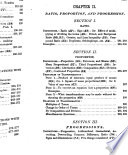 | Edward Olney - Algebra - 1877 - 466 pages
...Last Besvlt, 4mn. THREE IMPORTANT THEOREMS. 94. THEOREM. — The square of the sum of two quantities is equal to the square of the first, plus twice the product of the two, plus the square of the second. DEM. — Let x be any one quantity and y any other. The sum is x + y... | |
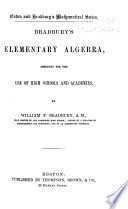 | William Frothingham Bradbury - Algebra - 1877 - 302 pages
...Sum 2 a — 8 b and difference 10 a -}- 14 b. THEOREM II. 58. The square of the sum of two quantities is equal to the square of the first, plus twice the product of the two, plus -the square of the second. Let a and b represent the two quantities ; their sum will be a + b.... | |
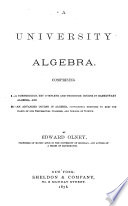 | Edward Olney - 1878 - 360 pages
...first adding the products by a and 6. 4. ED 85. THEO. — Tlie square of the sum of two quantities is equal to the square of the first, plus twice the product of the two, plus the square of the second. 86. THEO. — The square of the difference of two quantities is equal... | |
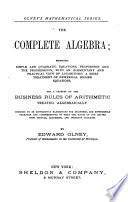 | Edward Olney - Algebra - 1878 - 516 pages
...Z/osi Result, 4.mn, THREE IMPORTANT THEOREMS. 04:. THEOREM. — The square of the sum of two quantities is equal to the square of the first, plus twice the product of the two, plus the square of the second. DEM. — Let x be any one quantity and y any other. The sum is x + y... | |
 | Benjamin Greenleaf - Algebra - 1879 - 322 pages
...formulas, useful in abridging algebraic operations. THEOREM I. 76. The square of the sum of two quantities is equal to the square of the first, plus twice the product of the first by the second, plus the square of the second. For, let a represent one of the quantities, and... | |
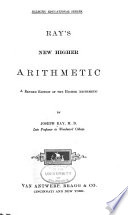 | Joseph Ray - Arithmetic - 1880 - 420 pages
...OPERATIONS. 4096= = 3600 + 480 + 16. The operations illustrate the following principle : PRINCIPLE. — The square of the sum of two numbers is equal to the...square of the first, plus twice the product of the first by the second, plus the square of the second. Thus : Show by involution, that : \. (5)2 equals... | |
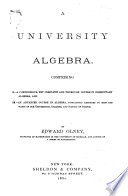 | Edward Olney - Algebra - 1880 - 354 pages
...first adding the products by a and u. Ч К. D. 85. THEO. — The square of the sum of two quantities is equal to the square of the first, plus twice the product of the two, plus the square of the second. 86. THEO. — The square of the difference of two quantities is equal... | |
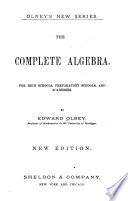 | Edward Olney - Algebra - 1881 - 506 pages
...Last result, 4ww. THEEE IMPORTANT THEOREMS. .94. Theorem. — The, square of the sum of two quantities is equal to the square of the first, plus twice the product of the two, plus the square of the second. Demonstration. — Let x be any one quantity and y any other. The sum... | |
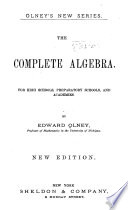 | Edward Olney - Algebra - 1881 - 504 pages
...Demonstration. — Let x be any one quantity and y any other. The sum is x + y ; and the square is, the square of the first, «*, plus twice the product of the two, 2xy, plus the square of the second, y\ That is (x+y)* = x' + Zxy+y*. For (x+yy = (x+y) (x+y) which... | |
| |